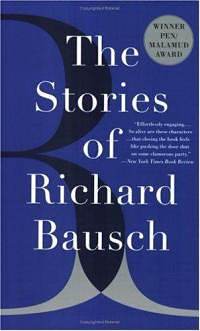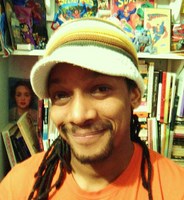
photo by Guillermo Ossa
by Morgan Omotoye
I’m two stories shy of completing The Stories of Richard Bausch – a six hundred odd page collection that weighs as much as a bag of sugar. I’ve been carrying it with me for some time now but despite its impressive heft, its indistinct cover never makes heads turn when I lug it out of my rucksack on the Tube or the bus. Over the months that I’ve been hauling the book around, it has taken a bit of a battering and now looks as though it’s been through a war: the spine is pleated and crisscrossed with white lines, and – since a banana exploded in its vicinity a while back – its pages are fairly manky. Really, the book has seen better days.
I’m not entirely sure what convinced me to buy it in the first place. I thought it was because I’d stumbled across one of Bausch’s stories in Raymond Carver and Tom Jenk’s American Short Stories, but when I went back and checked, nah-ah, not a Bausch amongst the bunch. I do remember reading an interview with him, though, in Off the Page, an anthology in which writers talk about their work. Looking through that book now, I can see that I underlined a lot of the comments he made. Here’s one for you:
Once I thought I had a novel and it turned out it was a short story. I wrote about eight hundred pages, but it ended up being a short story.
Wow. I would like to think this was what led me to Bausch’s work, the wry humour, his own awe and surprise at the shapes his stories take, but I’m sure the collected stories were in my possession long before I read that quote. In any event, I found his stories and now I’m nearly done with them.
 Bausch’s characters have that lived-in look. Life has bruised them, but not in any way that has stultified their humour and their ability – perhaps more accurately their ambition – to love. To connect with something greater than themselves.
Bausch’s characters have that lived-in look. Life has bruised them, but not in any way that has stultified their humour and their ability – perhaps more accurately their ambition – to love. To connect with something greater than themselves.
Ultimately, though, their needs exceed their grasp. In their relationships they are left wanting, not only in the quality of the love they give, but also in the love they receive. In the story ‘The Fireman’s Wife’, the main character feels alienated from her husband and isolated from his group of friends:
Everything seems to stand for the life that she wants for herself; an attentive, loving husband, children; and a quiet house with a clock that chimes. She knows that this is all very dreamy and childish and yet she looks at Eveline’s parents, those people with their almost thirty years’ love and her heart aches.
What is amazing about this story is how Bausch is able to dramatise the emotional inertia of a relationship. The characters are not particularly selfish, just careless, and this makes the ending all the more powerful.
Like real people, sometimes the characters in Bausch’s stories fail. The titular character in ‘Tandolfo the Great’ fails to marry the girl he loves and ends up alone, with a wedding cake in the back of his car. Shane (from the eponymous Western movie) fails to live up to the ideals of the boy who watched him ride into myth and legend. In the story ‘Valor,’ a husband fails to stop his wife from leaving him because he cannot articulate his act of heroism. Unable to get her to watch the television interview after he has saved a group of children from a burning bus, the character laments:
I just hoped that you’d see this one thing,’ he said, sitting next to her, wanting to fix this somehow, this new trouble. But then he saw how far away from him she had gone. He felt abruptly quite wrong, almost ridiculous.
These failures are often all that Bausch’s characters are left with, the feeling that happiness, joy and love are frail and transitory, warranting constant care and vigilance as seen in the closing lines of ‘The Last Day of Summer’:
Things could happen so fast, and if you take your eyes away even for a second, you might not be able to react in time if something went wrong.
Things often go wrong in Bausch’s stories. Characters fail to live up to their own best intentions, and it is this failure that makes them needy and cruel, and ultimately human.
There is a lot of rescuing – or at least attempts at rescuing – in Bausch’s stories, irrespective of how wounded or damaged the characters doing the rescuing are. Mothers drop everything to rescue daughters, sons rescue mothers, and fathers rescue daughters – all with unsuspected and sometimes dire consequence. Characters frequently show up to help someone, only to cause more damage than they prevent.
If all this seems gloomy and mordant, that feeling is tempered by the scintillating beauty of Bausch’s prose and by the great dollops of humour he includes. There is much to laugh about in ‘Tandolfo the Great,’ and the bolshy mother in ‘Weather’ will make you smile until your face aches, not because of her act of violence but because of her response to it.
Bausch’s characters feel like people you know. When you speak about them, they sound like your sisters, brothers, your mother and father, your friends and lovers, and the daughter of that neighbour you don’t talk to anymore. They are real and vibrant, clumsy and flawed, and one of Bausch’s amazing gifts is his ability to conjure up the myriad situations he places them in. I think it was Grace Palely who said that if Raymond Carver had given his characters the gift of just one more day, they would be a lot happier. Bausch gives his characters that extra day then watches as they tumble over the precipice. Yet they are not without hope for Bausch provides them the means to knit their own parachute.
There is much to appreciate in Bausch’s short stories: his subtle handling of time, of memory; his explorations of expansive and liminal environments which bring the readers’ breathing to that ‘inward eye of solitude’ that Wordsworth wrote about in ‘Daffodils.’ There is a koan-like tranquillity that descends at the end of his stories which allows for a greater scrutiny of ideas and images, and renders those ideas and images anew. There is also the extraordinary focus he places on his characters, his heroines and hard luck miscreants searching their pockets with their thumbs. It is Bausch’s ability to show the foibles of his characters as well as their moments of grace that enchants.
Here are the titles to some of Bausch’s stories: ‘The Voices from the Other Room’, ‘Glass Meadow’ and ‘What Feels like the World’. Don’t they sound like the titles of songs you would like to put on a compilation mix tape for the people you love?
It is possible to go online right now and hear Bausch speak about writing: what it takes to write and what a person should and should not allow themselves to get away with in their writing. He has been an inspiration to me and I am going to miss the weight of his book in my bag when I have finished. The book has been something of a talisman and a real place for me to recover some things that were lost. My copy of The Stories of Richard Bausch is tattered and scuffed, but it is filled with amazing stories that are worthy of anyone’s time. I have two more of his stories to read. I am near the end, but you can be at the beginning.
*
 Morgan Omotoye has been accepted for publication by the London Magazine, and his stories have appeared in Staple, Litro and Open Pen. He has a BA in Media and English from Sussex University, an MA in Creative and Life Writing from Goldsmith’s University, and taught English in China for a year. He created and runs a creative writing group at his local library. He continues to fight zombies and giant robots in his free time.
Morgan Omotoye has been accepted for publication by the London Magazine, and his stories have appeared in Staple, Litro and Open Pen. He has a BA in Media and English from Sussex University, an MA in Creative and Life Writing from Goldsmith’s University, and taught English in China for a year. He created and runs a creative writing group at his local library. He continues to fight zombies and giant robots in his free time.

